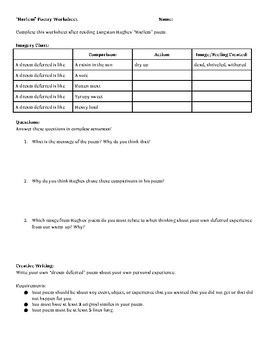
Langston uses his literary skills to mold the poem to give encouragement to anyone that no matter how oppressed they are, eventually their beauty will shine throw and they will rise above. The use of imagery in the poem shows the reader that the black man in the oppressed party but he has hope that one day he will overcome the oppression and sit as an equal to the white man. “They send me to eat in the Kitchen” (line 3), this line reminds the reader of the times of slavery when the black man was not allowed to share anything with the white man including toilets and roads. “They’ll see how beautiful I am” (line 16), here the author is not talking about physical beauty but the inner beauty such as talent, skills, humanity. “Tomorrow” (line 8) is a metaphor for the future, a hopeful future where all people will be equal.

“I am the darker brother” (line 2), darker here represents the African American community and not evil, as in dark soul. The ‘I’ does not represent the author himself but can be interpreted to represent a larger grouping of people. The author uses the first person ‘I’ in the poem. There is a lot of metaphor and imagery throughout the poem that help to shape its theme. The reader can empathize with the person as they overcome their obstacles to rise to be equal with their oppressor, “I’ll be at the table” (line 9). These terms give the reader the sense that the author is speaking of their plight hence giving more credibility to the message. The author also uses ‘they’ instead of a particular term as a name, “They send me …” (line 3), and “They’ll see …” (line 16). The author uses ‘I’ many times throughout the poem, “But I laugh” (line 5), “I’ll be …” (line 9). Using dramatic monologue Hughes gives the theme of the poem a firsthand experience feel. This allusion is meant to show that the black man is as American as everyone else and hence should not be oppressed and treated as a second class citizen. Hence, when Hughes writes “I, too, sing America” he also sees himself as part of the chorus singing about being American. All these people sing their various songs, and it comes together to form a sort of a chorus that represents being American (Whitman & Holloway, 1942). In the poem, Whitman talks about the singing of different people in society. From this line the reader is immediately reminded of the poem by Walt Whitman, ‘I hear America Singing’ (Whitman & Holloway, 1942).

We see allusion right from the start of the poem when the author writes, “I, too, sing America” (line 1). Langston Hughes aptly uses allusion, dramatic monologue and imagery to mold the poem into an extended metaphor on overcoming oppression.Īllusion is used by many poets to point to a particular idea they want to express without directly stating it. The poem itself greatly exemplifies this period in its theme.

The talents of African American writers and artists were beginning to be recognized and appreciated by the greater artistic community. The poem was written during the period of the Harlem Renaissance a time when writers from the black community had started rising from obscurity. ‘I, Too’ by Langston Hughes is a short poem that talks about a man who is hidden from guests but later comes to be accepted.


 0 kommentar(er)
0 kommentar(er)
